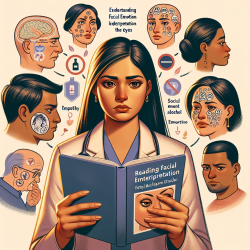Introduction
In the realm of mental health, particularly in low-resource settings, the need for effective interventions is critical. The study titled "Diffusion and Spillover Effects of an Evidence-Based Mental Health Intervention among Peers and Caregivers of High Risk Youth in Sierra Leone" offers invaluable insights into how cognitive behavioral therapy (CBT)-based interventions can extend their reach beyond direct participants. This blog explores how practitioners can implement these findings to enhance their skills and encourage further research.
Understanding Diffusion and Spillover Effects
The study focuses on the Youth Readiness Intervention (YRI), a CBT-based program designed for high-risk youth in Sierra Leone. The research highlights two key concepts: diffusion and spillover effects. Diffusion refers to the spread of intervention benefits through social networks, while spillover effects indicate the indirect benefits experienced by non-participants, such as caregivers.
Implementing the Findings
Practitioners can enhance their skills by incorporating the following strategies based on the study's findings:
- Leverage Social Networks: Encourage participants to share CBT techniques with peers, fostering a natural diffusion of skills. This approach not only extends the intervention's reach but also empowers participants as active agents of change.
- Engage Caregivers: Recognize the potential spillover effects on caregivers. By involving them in the intervention process, practitioners can amplify the overall impact, improving household dynamics and reducing caregiver burden.
- Focus on Simple Techniques: The study suggests that simpler CBT components, such as deep breathing exercises, are more likely to be shared. Practitioners should prioritize teaching these techniques to maximize diffusion.
- Conduct Cost-Effectiveness Analysis: Incorporate indirect benefits into cost-effectiveness analysis to provide a more comprehensive understanding of the intervention's value. This approach can attract funding and support for scaling up interventions.
Encouraging Further Research
The study opens avenues for further research, particularly in understanding the mechanisms of diffusion and spillover effects. Researchers are encouraged to explore:
- Pathways of Diffusion: Investigate how specific intervention components are shared within social networks and identify factors that enhance or hinder diffusion.
- Long-Term Spillover Effects: Examine the sustained impact of interventions on caregivers and other non-participants over time.
- Cross-Cultural Adaptation: Adapt and test the YRI model in different cultural contexts to assess its generalizability and effectiveness.
Conclusion
The study on the diffusion and spillover effects of the YRI in Sierra Leone provides a compelling case for the broader implementation of evidence-based mental health interventions in low-resource settings. By leveraging social networks and engaging caregivers, practitioners can extend the reach and impact of these interventions, ultimately contributing to better mental health outcomes for entire communities.
To read the original research paper, please follow this link: Diffusion and spillover effects of an evidence-based mental health intervention among peers and caregivers of high risk youth in Sierra Leone: study protocol.










